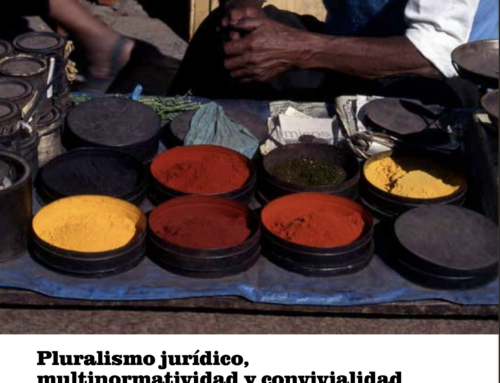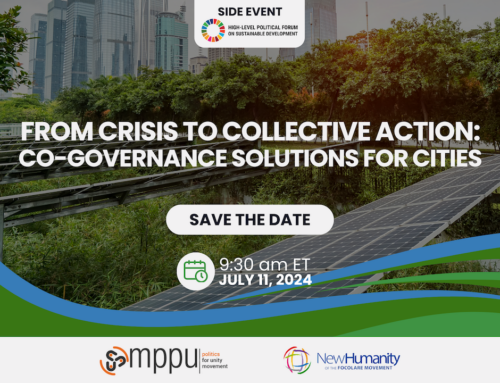As part of the International Online Seminar of the Politics for Unity Movement (MPPU) “Politics and Policies for Unity in the Times of Global Change: Ideas, Commitments, Contributions” that took place on December 10-11, 2020, a dialogue was held on “The proposal of the charism of unity to politics. Unity as an end and as a method”. The two speakers were Pasquale Ferrara (Italy) and Javier Baquero (Colombia).
We report below the speech of Javier Baquero.
Javier Baquero, Colombia
For us, as the Politics for Unity Movement, it is fundamental to ask ourselves about Unity in politics: it is a principle, an ideal, a method and an end, so the key questions are: what do we mean by Unity, why is it fundamental in politics, and how can we achieve it?
The first element starts from what Reka and Pasquale enunciated, it refers to the consciousness of being one reality, one system, one body as humanity and with the planet. This reminded us that we have failed to internalise the effects of the pandemic and climate change because we have not yet learned to think, feel and act in coherence with this interconnected and interdependent reality.
Reality shows us that we are in essence a single system that, although communicated and full of interactions, has deep wounds, fragmentations and cracks, which are formed in channels of various types of violence between human beings and of these with nature, blurring the connection with the whole and every other detail, thus causing the multiple pains that we can find not only in the most materially vulnerable, but in those deprived of relationships, affection and a sense of existence.
This is how unity is an ideal for us, because only by recognising ourselves as one do we recognise the value for us of the whole and the parts, but also of the relationship. This awareness requires us to heal and heal any fractures that may exist, so that the one can be realised. To recompose ourselves as humanity and in one reality constitutes a greater good or a universal goal, to unite by weaving and repairing every fracture would be the most relevant motivation and political practice.
Unity is also an aim in itself, a place where we would like to arrive or where we hope to be socially, because as we experience it directly in those countries at war like Colombia, its absence consigns us to ruthless violence, indifference to pain and the subjugation of some over others, completely preventing us from prosperity and development. That is why it is our political objective to generate or recompose unity among all that is fractured.
But unity, as a means or method, starts from the understanding of the interdependence between the parties, it can promote the constitution of a social fabric, a bond of reciprocity, cooperation, collaboration and therefore collective action. Thus, unity in politics refers to recognising oneself in the same boat, which may founder or reach a good harbour, a product of the effectiveness or otherwise of global collective action.
In these terms, the fragmentary vision of political exercise and the imagery of the enemy imported by the war into the field of politics, which makes it a simple process of gaining power, reduces politics itself to a minimal expression of its capacity, and brings it back to the private field of competition for a good and for a particular benefit. This is how this vision, where the goal of attaining power and the process of its management become an aim in themselves, prevents it from achieving its noblest mission, the common good of the planet.
The lack of unity in political practice leads politicians into the schizophrenia of mistrust, hatred, prudence, lack of transparency, thirst for power and authoritarianism, which in their political results end up being incipient and reduced in their ability to transform and solve public problems. But this in personal terms of politicians means violence that leads to exclusion, denial or even elimination.
Unity is a political principle that can become an institution, a guiding parameter of social behaviour, thus a determinant of the overall political culture, enabling us to improve the quality of the exercise of this profession, the promotion of virtuous relations between the various actors and the achievement of universal public policy objectives.
So far I have answered the question of what we can mean by unity and why it is fundamental to politics, however, one of the most difficult questions to answer remains, especially from the field of ideas, which is how we construct it or how we can achieve it.
It is already a legacy of these almost 25 years of the MPPU to recognise that one of the means is the promotion of universal fraternity, which invites us to love the other’s country as my own, to love the other parties as my own, to promote dialogue, to recognise differences and value them, to make our own the visions and concerns of other politicians and citizens, to infect all politicians to exercise their profession out of love and service, to find the commonalities produced by consensus and to grow in conscience together with other politicians.
But the current context invites us to promote new political innovations, capable of responding to the need for politics to play a greater role in guiding the world towards the common good. We have therefore taken the liberty of proposing the following elements:
- Raising the quality of politics. Today we can see that political systems are fragile, even in the oldest democracies with a long history, it is evident that politics has lost its main role in achieving universal goals, since the political culture is based on the clash to obtain power. In these terms we have the challenge of generating knowledge and disseminating it, but above all it is necessary to promote new political practices where politics is given dignity again and has the authority to achieve the common good of the planet.
- Promoting the paradigm of care as the goal of politics. This pandemic has made it clear to us how fragile we are as a species, but above all it has allowed us to recognise that a supreme goal of politics is to ensure the care of a dignified life.
- Develop new forms of government, guided by collaborative governance. No government has the full capacity to solve all problems, so models of government are needed that promote collective action for common goals, identified and executed jointly with all parties, the various public authorities, the private sector, academia and international cooperation.





Leave A Comment